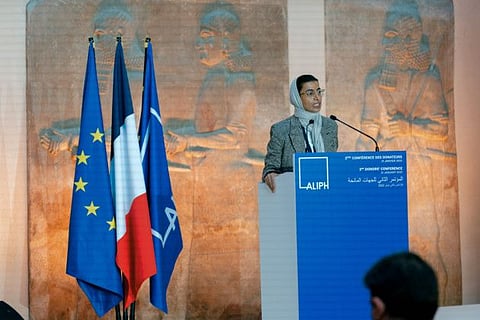UAE commits $20million to preserve heritage in conflict zones until 2027
ALIPH second donor conference assembled patrons to shore up financial support

Abu Dhabi: The UAE has committed to donate $20million (Dh73.56 million) to the International Alliance for the Protection of Heritage in Conflict Areas (ALIPH).
The commitment was made at the second ALIPH donors’ conferences, which was held at the Louvre Museum in Paris. Noura Al Kaabi, UAE Minister of Culture and Youth, addressed the conference, which was opened with a videoconferenced address by French President, Emmanuel Macron. Mohamed Al Mubarak, chairman of the Department of Culture and Tourism in Abu Dhabi (DCT Abu Dhabi) and vice-chair of the ALIPH Foundation board, also joined the event virtually.
Support foundation efforts
The conference aimed to adopt a new strategy for the upcoming period from 2023-2027 and reaffirm political and financial support for this initiative. The UAE’s donation will support the foundation’s ongoing and future projects up to the year 2027.
“The UAE is a founding member of this extraordinary initiative that funds the restoration and rehabilitation of humanity’s heritage sites in conflict zones across the world. We are very proud of ALIPH’s journey so far and hope to see even greater international mobilisation in this direction,” Al Kaabi said.
“We are committed to safeguarding and protecting the heritage in both tangible and intangible forms. Our visionary leaders have inspired us to take pride in our history and our roots and also taught us to embrace the cultures of the world. We believe that staying connected to our roots is the first step towards building a strong future. We also believe in preserving heritage for future generations in order to build a better world. In a world with growing disparities, we need to build bridges to bring people closer and celebrate diversity and pluralism,” she said.
UAE restoration projects
Al Kaabi also applauded the role of ALIPH, and shed light on restoration projects undertaken by the UAE in Iraq, including the ‘Revive the Spirit of Mosul’ project which the UAE is executing in partnership with UNESCO (United Nations Educational, Scientific and Cultural Organisation.
She stressed the importance of rebuilding of heritage sites destroyed by war or acts of terrorism. Such restoration holds value in terms of rehabilitating the people living in those areas, and by job opportunities for the local populations.
Foundation created
The idea of a fund to restore, reconstruct and rehabilitate the heritage of war-torn regions took root at a conference in Abu Dhabi in December 2016. Thereafter, ALIPH was born in March 2017 at the initiative of the UAE and France, with the support of UNESCO. Since then, several other countries and private partners have joined the initiative and supported the financing of nearly 150 projects in 30 countries.
At the time of its launch, Geneva-based ALIPH was supported by seven donor countries, including the UAE, France, Saudi Arabia, Kuwait, Luxembourg, China and Morocco, along with three private donors — Dr Thomas S. Kaplan, the Foundation Gandur pour l’Art, and the Andrew W. Mellon Foundation.
Multiple projects
The foundation secured an amount of $80million at the first donors’ conference held in 2017. In the last five years, ALIPH has supported some of the greatest cultural heritage treasures of humanity, such as the Tomb of Askia in Mali, the museums of Mosul (Iraq) and Raqqa (North-East Syria), the Minaret of Jam and the Bala Hissar Citadel (Afghanistan), as well as the Arch of Ctesiphon (Iraq).
The alliance also funded the rehabilitation work on the Museum of Civilisation in Côte d’Ivoire, the Sondondo Valley in Peru, Agadez in Niger, Ghadames in Libya, Adulis in Eritrea, Ta’izz in Yemen and also Koh Ker in Cambodia. It has been instrumental in safeguarding the interests of religious minorities in conflict zones and has mobilised resources in the face of emergencies, such as the COVID-19 pandemic and the port of Beirut explosions.



